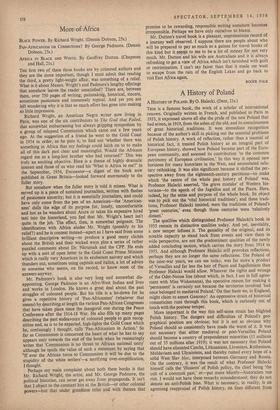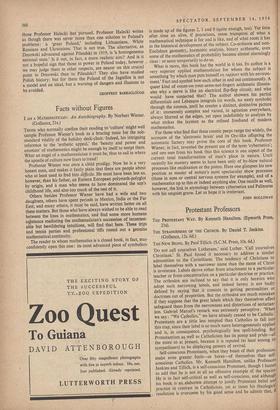A History of Poland
A HISTORY OF POLAND. By O. Halecki. (Dent, 21s.) THIS is a famous book, the work of a scholar of international renown. Originally written in French, and published in Paris in 1933, it expressed above all else the pride of the new Poland that had arisen, in 1919, from the ashes of the old, and its consciousness of great historical traditions. It won immediate recognition because of the author's skill in picking out the essential problems of Polish history. A work of reflection, rather than a manual of historical fact, it treated Polish history as an integral part of European history, showed how Poland became part of the Euro- pean community, and assessed its contribution 'to the common patrimony of European civilisation.' In this way it opened new horizons for many historians in the West, and necessitated salu- tary rethinking. It was also significant because it shifted the per- spective away from the eighteenth-century partitions—to make which 'the centre of the whole past history of Poland' was, Professor Halecki asserted, 'the grave mistake' of Western his- torians—to the epoch of the Jagiellos and of the Piasts. Here, indeed, lay the sense and purpose of the whole book. Its object was to pick out the 'vital historical traditions'; and these tradi- tions, Professor Halecki insisted, were the traditions of Poland's 'great centuries,' even though those centuries were 'relatively distant.'
The qualities which distinguished Professor Halecki's book in 1933 remain its distinctive qualities today. And yet, inevitably, a new temper infuses it. The geniality of the original, and its notable capacity to stand back from events and view them in wide perspective, are not the predominant qualities of the newly added concluding section, which carries the story from 1914 to 1955. And although Professor Halecki still provokes reflections, 'perhaps they are no longer the same reflections. The Poland of the inter-war years, we can see today, was far more a product of. Versailles and far less the heir of Piasts and Jagellonians than Professor Halecki would allow. Whatever the rights and wrongs of the Oder-Neisse line (about which, in fact, I am in full agree- ment with Miss Wiskemann), the operative reason for making it 'permanent' is certainly not because the territories involved 'had once belonged to medieval Poland.' On that basis we, in England, might claim to annex Gascony! An oppressive strain of historical romanticism runs through this book, which is curiously out of touch with the postwar temper.
More important is the way this self-same strain has blighted Polish history. The dangers and difficulties of Poland's geo- graphical position are obvious; but it is not so obvious why Poland should so consistently have made the worst of it. It was not necessary that either medieval or post-Versailles Poland should become a country of preponderant minorities (11 millions out of 35 millions after 1919); it was not necessary that Poland should have alienated Czechs, Lithuanians, Livonians, Ruthenians, Moldavians and Ukrainians, and thereby ruined every hope of a solid West Slav bloc, interposed between Germany and Russia. On the contrary, it was the result of what Professor Halecki himself calls the 'illusions' of Polish policy, the chief being 'the cult of a common past,' or—put more bluntly—historicism run riot. I would not have these remarks misunderstood; they do not denote an anti-Polish bias. What is necessary, in reality, is an agonising reappraisal of Polish history, on lines different from
those Professor Halecki has pursued. Professor Halecki writes as though there was never more than one solution to Poland's problems : a 'great Poland,' including Lithuanians, White Russians and Ukrainians. That is not true. The alternative, as Dmowski advocated against Pilsudski in 1919, is 'a homogeneous national state.' Is it not, in fact, a more realistic aim? And is it not a hopeful sign that those in power in Poland today, however we may judge them in other respects, are nearer on this crucial point to Dmowski than to Pilsudski? They also have studied Polish history; but for them the Poland of the Jagiellos is not a model and an ideal, but a warning of dangers and illusions to be avoided.
GEOFFREY BARRACLOUGH GEOFFREY BARRACLOUGH



































 Previous page
Previous page